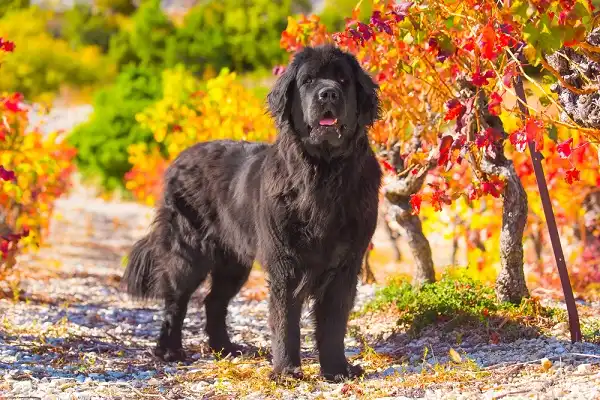Newfoundland dogs are a large breed of working dogs from the province of Newfoundland and Labrador in Canada. They are strong, muscular dogs with webbed feet, which make them excellent swimmers. They are also known for their thick, waterproof coat, which helps protect them from cold weather and water. Newfoundlands are gentle giants who enjoy spending time with their family and friends. If you’re looking for a loving, loyal companion, then a Newfoundland dog might be the perfect fit for you!

Newfoundland Description
This large breed of working dogs originates from Canada’s province of Newfoundland and Labrador and is known for its strong muscular body and webbed feet which make them excellent swimmers. With their webbed feet, these dogs can navigate through shallow water with ease. They also have a thick waterproof coat that shields them from cold temperatures and icy waters.
Newfoundland Habitat
Newfoundland dogs are primarily found in the province of Newfoundland and Labrador in Canada, where they have been bred over generations to be strong working dogs. The terrain of Newfoundland and Labrador is mostly rocky and hilly, providing plenty of natural obstacles for the Newfoundlands to explore. With their webbed feet, these dogs can navigate through shallow water with ease. Newfoundland dogs are known for their intelligence and strong work ethic, making them ideal companions for active families. With regular exercise, they can keep up with activities like hiking, swimming, running, and playing fetch. When taking them out in public or on a walk, it’s important to always keep a leash on Newfoundlands as they can become distracted by smells or sights and wander away from home.
Newfoundland Diet
Newfoundland dogs are a large, strong breed of working dogs that require a balanced diet to stay healthy and active. They should be fed high-quality dog food specifically formulated for their size, as this will provide them with all the essential vitamins and minerals they need throughout adulthood. Dry kibble designed for large-breed puppies is also recommended during this stage of life to ensure proper growth and development. In addition to kibble, Newfoundlands can also benefit from fresh water, lean meats, fruits, and vegetables.
Lean meats such as chicken, turkey, or fish are excellent sources of protein and can help keep muscle mass up while providing vital nutrients for the heart and immune system. Fruits and vegetables are also beneficial for Newfoundlands as they are packed with fiber, vitamins, minerals, and antioxidants which can help fight off disease-causing free radicals in the body. Feeding a combination of these foods will ensure your Newfoundland gets all the nutrients they need while avoiding obesity that could lead to joint problems later on in life.

Newfoundland Size
Newfoundlands are large, powerful breeds of working dogs that can weigh anywhere from 100-150 pounds. While males tend to be larger than females, both sexes can reach the same height up to 28 inches at the shoulder. This makes them one of the largest dog breeds in terms of size and weight, making them an ideal companion for active families or individuals looking for a big and loyal pet. Despite their size, Newfoundlands are surprisingly agile and possess great strength and endurance. This makes them excellent swimmers, superb pullers for sleds or carts, and tireless hikers who can keep up with even the most adventurous outdoor enthusiast. In addition to their athletic abilities, Newfoundlands are also known for their intelligence which in combination with their strong work ethic make them ideal candidates for police dogs or search-and-rescue missions.
Newfoundland Lifespan
Newfoundlands are known for their impressive longevity and can live an average life expectancy of up to 12-14 years, with some living even longer. This is a long lifespan compared to smaller breeds such as Chihuahuas or Pomeranians which only live 8-10 years on average. The key to a Newfoundland’s longevity is providing them with the right level of exercise, nutrition, and veterinary care throughout their lifetime. When it comes to exercise, Newfoundlands need daily walks and plenty of time outdoors in order to stay healthy and happy. Make sure they get at least 30 minutes of exercise every day, preferably more if they have extra energy or are prone to boredom. Additionally, activities like swimming provide excellent exercise for Newfoundlands as they are natural swimmers thanks to their double coat which helps keep them warm in cold water.
Newfoundland Behavior
Newfoundlands are known for their gentle and loyal personalities, making them ideal family pets. They are highly intelligent and learn commands quickly, although they may take a bit longer to get used to new people or situations. Newfoundlands have a strong protective instinct which makes them great guard dogs but can also lead to overprotectiveness of their owners if not trained properly. Although they can be stubborn at times, Newfoundlands are generally eager to please and respond best to positive reinforcement training that includes plenty of treats and verbal praise. Start by teaching basic commands such as sit, stay, down, come, and leave it as early as possible so that your Newfoundland knows how to behave in different scenarios. Additionally, socialization is important when it comes to Newfoundlands; exposing them to different environments and people will help prevent any aggressive behavior due to fear or anxiety.

Newfoundland Speed
Newfoundland dogs are surprisingly fast and athletic for their size, though they have not been bred to be speedsters. They have an average top speed of around 8 mph when running, which is especially impressive when you consider that the average human can only reach 10 mph under ideal conditions. In a long run, they’re able to maintain a trotting pace of 5-7 mph, which makes them great jogging partners. When it comes to swimming, Newfoundlands are natural-born athletes and can easily keep up with most other breeds in the water. This is because they possess webbed feet and a double coat that helps insulate them from the cold temperatures of the water. They can reach speeds of up to 3 mph in short bursts, making them one of the fastest swimmers among all canine breeds.
Newfoundland Hunting
Newfoundlands were originally bred as loyal and hardworking water dogs, and in some areas of the country, they are still used for hunting. While their size and gentle nature make them ill-suited for pursuing larger game such as deer or elk, Newfoundlands excel at hunting ducks, geese, and other waterfowl. They have powerful webbed feet that allow them to paddle through thick vegetation and deep waters with ease. Additionally, their strong scenting ability allows them to detect prey from afar.
Newfoundland hunters must be well-trained in order to ensure successful hunts. The dog should understand basic commands such as ‘come’ and ‘stay’ so that they can be directed when necessary. When out in the field on a hunt, Newfoundlands make great companions who watch attentively for birds in flight or submerged in the water. Once the game has been spotted they will alert their handler by barking or pointing with their head or tail – which is called quartering – while staying close enough so that they may be easily located if lost in thick vegetation or murky waters.

Conclusion
Newfoundlands are strong, loyal, and versatile dogs who excel at a variety of activities. Whether they’re running, swimming, or participating in pull sports, these pets can easily keep up with other breeds due to their impressive strength and speed. Additionally, Newfoundlands make excellent hunting companions as well if they’re given the proper training for the task. All in all, this breed is an amazing choice for those looking for an active and devoted companion.
Frequently Asked Question

